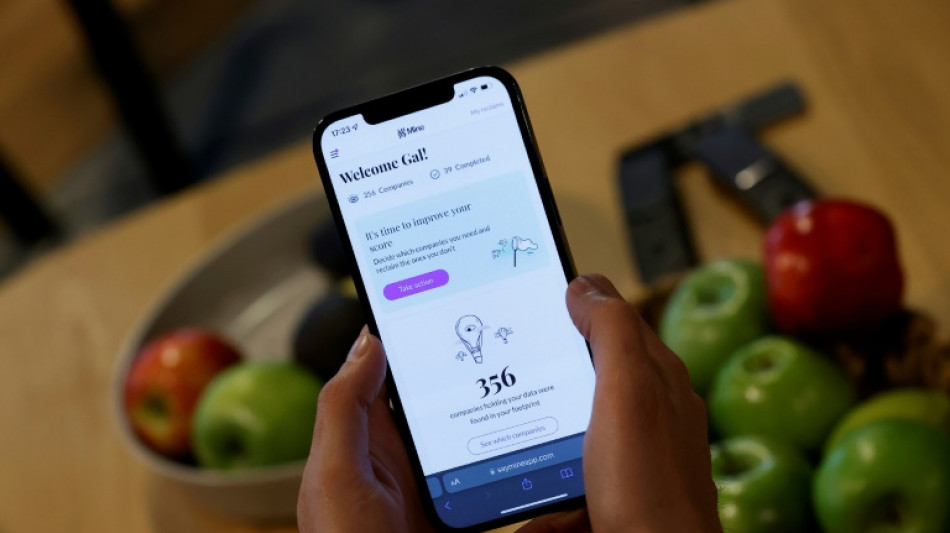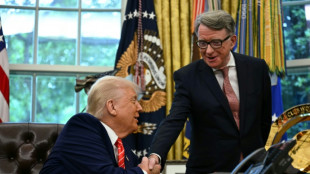
-
 Anything but Europa League glory 'means nothing' for Man Utd: Amorim
Anything but Europa League glory 'means nothing' for Man Utd: Amorim
-
'Inexcuseable' - NBA champs Boston in trouble after letting big leads slip

-
 Pope Leo 'fell in love with Peru'and ceviche: Peru bishop
Pope Leo 'fell in love with Peru'and ceviche: Peru bishop
-
Pakistan's T20 cricket league moved to UAE over India conflict

-
 India tells X to block over 8,000 accounts
India tells X to block over 8,000 accounts
-
Germany's Merz tells Trump US remains 'indispensable' friend

-
 Ex-model testifies in NY court that Weinstein assaulted her as a minor
Ex-model testifies in NY court that Weinstein assaulted her as a minor
-
Chelsea ease past Djurgarden to reach Conference League final

-
 Man Utd crush Athletic Bilbao to set up Spurs Europa League final
Man Utd crush Athletic Bilbao to set up Spurs Europa League final
-
Spurs reach Europa League final to keep Postecoglou's trophy boast alive

-
 US unveils ambitious air traffic control upgrade
US unveils ambitious air traffic control upgrade
-
US climate agency stops tracking costly natural disasters

-
 Germany slams Russian 'lies', France warns of war 'spectre' in WWII commemorations
Germany slams Russian 'lies', France warns of war 'spectre' in WWII commemorations
-
'A blessing': US Catholics celebrate first American pope

-
 Trump hails 'breakthrough' US-UK trade deal
Trump hails 'breakthrough' US-UK trade deal
-
Cardinals elect first American pope as Robert Francis Prevost becomes Leo XIV

-
 NHL Ducks name Quenneville as coach after probe into sex assault scandal
NHL Ducks name Quenneville as coach after probe into sex assault scandal
-
'Great honor': Leaders welcome Leo, first US pope

-
 What is in the new US-UK trade deal?
What is in the new US-UK trade deal?
-
MLB Pirates fire Shelton as manager after 12-16 start

-
 Alcaraz '100 percent ready' for return to action in Rome
Alcaraz '100 percent ready' for return to action in Rome
-
Prevost becomes first US pope as Leo XIV

-
 Andy Farrell holds out hope for son Owen after Lions omission
Andy Farrell holds out hope for son Owen after Lions omission
-
Roglic leads deep field of contenders at tricky Giro d'Italia

-
 White smoke signals Catholic Church has new pope
White smoke signals Catholic Church has new pope
-
Bill Gates speeds up giving away fortune, blasts Musk

-
 LA Coliseum, SoFi Stadium to share 2028 Olympic opening ceremony
LA Coliseum, SoFi Stadium to share 2028 Olympic opening ceremony
-
Trump unveils 'breakthrough' US-UK trade deal

-
 Andy Farrell holds out hope for Owen Farrell after Lions omission
Andy Farrell holds out hope for Owen Farrell after Lions omission
-
Trump calls US Fed chair 'fool' after pause in rate cuts

-
 Stocks rise as US-UK unveil trade deal
Stocks rise as US-UK unveil trade deal
-
UN says Israel school closures in east Jerusalem 'assault on children'

-
 Itoje grateful for 'tremendous honour' of leading Lions in Australia
Itoje grateful for 'tremendous honour' of leading Lions in Australia
-
Cardinals to vote anew for pope after second black smoke

-
 Arsenal fall short again as striker woes haunt Arteta
Arsenal fall short again as striker woes haunt Arteta
-
Inter turn attentions to fading Serie A title defence after Barca triumph

-
 Elk could return to UK after 3,000 years as plan wins funding
Elk could return to UK after 3,000 years as plan wins funding
-
Trump announces 'full and comprehensive' trade deal with UK

-
 Putin and Xi rail against West as Ukraine reports truce violations
Putin and Xi rail against West as Ukraine reports truce violations
-
England's Itoje to captain British and Irish Lions rugby team in Australia

-
 Gates Foundation to spend $200 bn through 2045 when it will shut down
Gates Foundation to spend $200 bn through 2045 when it will shut down
-
Swiatek makes fast start at Italian Open

-
 Israel's aid blockade to Gaza 'unacceptable': Red Cross
Israel's aid blockade to Gaza 'unacceptable': Red Cross
-
EU threatens to target US cars, planes if Trump tariff talks fail

-
 Amnesty says UAE supplying Sudan paramilitaries with Chinese weapons
Amnesty says UAE supplying Sudan paramilitaries with Chinese weapons
-
Bank of England cuts interest rate as US tariffs hit economy

-
 Germany slams Russian 'lies' on Ukraine in WWII commemoration
Germany slams Russian 'lies' on Ukraine in WWII commemoration
-
Pakistan and India accuse each other of waves of drone attacks

-
 Thrilling PSG home in on elusive Champions League trophy
Thrilling PSG home in on elusive Champions League trophy
-
Wolf protection downgrade gets green light in EU


'Right to be forgotten': Israel firm promises to purge digital footprint
Three young Israelis formerly serving in military cyber units have figured out how to locate your digital footprint -- and give you the tools to delete it.
The company Mine, co-founded by Gal Ringel, Gal Golan and Kobi Nissan, says it uses artificial intelligence to show users where their information is being stored -- like whether an online shoe store kept your data after a sneaker purchase three years ago.
Ringel said Mine's technology has already been used by one million people worldwide, with over 10 million "right to be forgotten" requests sent to companies using the firm's platform.
Mine launched after the European Union's General Data Protection Regulation (GDPR) -- now an international reference point -- set out key rights for users, including the deletion of personal data that was shared with a site for a limited purpose.
The company's AI technology scans the subject lines of users' emails and flags where data is being stored.
Individuals can then decide which information they want deleted and use Mine's email template to execute their right to be forgotten.
It means they can delete their digital footprint "with a click of a button", Ringel said.
"We're not telling people to not use Facebook or Google. We say: go ahead, enjoy, use whatever you want," he said.
"But as you enjoy using the internet, we'll show you who knows what about you, what they know about you... what is the risk" and how to remove it, he added.
- 'Challenging' -
Last year, hackers broke into the database of Atraf, an Israeli LGBTQ dating website, using the personal information there for extortion.
The year before, Shirbit, a major insurance company, was hacked and troves of data stolen.
Despite those and smaller breaches, Naama Matarasso Karpel from advocacy group Privacy Israel said the public was relatively indifferent.
She also criticised Israel's privacy legislation as inadequate for tackling today's online challenges.
"Privacy is a bit like health or air -- we don't really feel the need for it until we really see how much we lack it," she said.
While public awareness on privacy rights has been slow on the uptake, she said many corporations were realising that better privacy practices made for good business.
"Nobody wants to be caught off-guard," Matarasso Karpel said.
Companies are starting to see privacy "as a value that has to be maintained in order to establish trust with customers", she added.
Mine's co-founder Ringel said companies had contacted his firm for help with the "challenging and cumbersome" process of locating and removing information, in line with the right to be forgotten.
"We help companies to automate that process without any human involvement," he said, reducing their efforts and costs.
But lawyer Omer Tene, co-founder of the Israel Tech Policy Institute, cautioned that deleting specific individual requests was "a complicated technical exercise".
Some companies and organisations cannot legally delete information like blockchains or records of financial interactions needed for tax purposes.
Even information that can be deleted is often kept in varying degrees of identifiability, Tene said.
"All of this nuance makes it difficult to deliver on a promise from both the consumer side and the corporate side, to enable deletion by pressing a button," Tene warned.
C.Garcia--AMWN